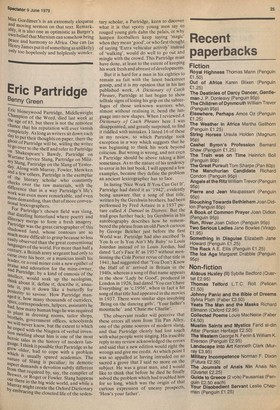Eric Partridge
Benny Green
Eric Honeywood Partridge, Middleweight Champion of the Word, died last week at the age of 85, but there is not the remotest chance that his reputation will ever vanish completely. As long as writers sit down each day to put their thoughts on paper, there the ghost of Partridge will be, willing the writer to go over to the shelf and refer to Partridge on Shakespeare's Bawdy, Partridge on Wartime Service Slang, Partridge on Military Slang, Partridge on the Slang of Yesterday. Along with Murray, Fowler, Mencken and a few others, Partridge is the exemplar of the literary scholar who constantly Checks over the raw materials, with the difference that in a way Partridge's life's work was even more remarkable, and even more demanding, than that of more conventional lexicographers. For Partridge's chosen field was slang, that dazzling hinterland where poetry and illiteracy merge to form a fresh imagery. Partridge was the great cartographer of this shadowed land, whose contours are so much more difficult to grasp because so less c, asily observed than the great conventional tatiguages of the world. For more than half a century, a British army sergeant had only to curse over his beer, or a musician insult his leader, or a coal miner coin a new epithet of Praise and adoration for the mine-owner, and Partridge, by a kind of osmosis of the intellect, would soak up the neologism, think about it, define it, describe it, annotate it, pin it down like a butterfly for Posterity to savour. How Partridge managed it, how many thousands of outriders, skpies, correspondents, helpers, assistants he 'lad, how many human bugs he was required to plant in dressing rooms, tailor shops, brothels, government offices, schoolyards vyk c will never know, but the extent to which "e coPed with the Niagara of verbal invention swirling about him is one of the most heroic tales in the history of modern language. I think it possible that Partridge as he grew older, had to cope with a problem which is usually spared academics. The nature of Slang is peculiar; its demotic aspect demands a devotion subtly different from that required by, say, the compiler of Brewer, or Roget or Fowler. Slang happens out there in the big wide world, and while a by might create the Oxford Dictionary oy embracing the closeted life of the seden tary scholar, a Partridge, keen to discover what it is that spotty young men say to rouged young girls dahn the palais, or why lumpen footballers keep saying 'magic' when they mean 'good', or who first thought of saying 'Extra vehicular activitly' instead of 'walking', would do well to go out and mingle with the crowd. This Partridge must have done, at least to the extent of keeping his work fresh and abreast of developments.
But it is hard for a man in his eighties to remain au fait with the latest backstreet gossip, and it is my opinion that in his last published work, A Dictionary of Catch Phrases, Partridge at last began to show telltale signs of losing his grip on the subterfuges of those unknown warriors who, almost without realising it, bend the language into new shapes. When I reviewed A Dictionary of Catch Phrases here I was disappointed, and greatly surprised, to find it riddled with mistakes. I listed 16 of these in my review, to which Partridge took exception in a. way which suggests that he was beginning to think his work beyond criticism. But wrong is wrong, and not even a Partridge should be above taking a hint sometimes. As to the nature of his tendency to error in his last book, I will append a few examples, because they define the problem an ancient lexicographer has to face.
In listing 'Nice Work If -You Can Get It', Partridge had dated it as '1942', evidently being unaware that a song of that title, written by the Gershwin brothers, had been performed by Fred Astaire in a 1937 picture called A Damsel in Distress. But the trail goes further back; Ira Gershwin in his autobiography describes how he remembered the phrase from an old Punch cartoon by George Belcher just before the first World war. Partridge had also ascribed 'Is You Is or Is You Ain't My Baby' to Louis Jourdan instead of to Louis Jordan, had dated 'Let's Face It' as 1957 without mentioning the Cole Porter revue of that title in 1941, had suggested that 'You Don't Know the Half of it' arrived in Britain in the 1940s, whereas a song of that name appears in the show 'Lady be Good', produced in London in 1926, had dated 'You can't have Everything' as `c.1956', when in fact a hit song of that title had appeared in the movies in 1937. There were similar slips involving 'Bring on the dancing girls', 'Your father's moustache' and 'Chase me Charlie'.
The observant reader will perceive that these errors all stem from Tin Pan Alley, one of the prime sources of modern slang, and that Partridge clearly had lost touch with what people were singing. His irascible reply to my review acknowledged the errors and said that a new edition would right the wrongs and give me credit. At which point I was so appalled at having intruded on so sacred a grove that I said no more on the subject. He was a great man, and I would like to think that before he died he finally solved the problem which had troubled him for so long, which was the origin of that curious expression of uneasy prospects, 'How's your father'.










































 Previous page
Previous page